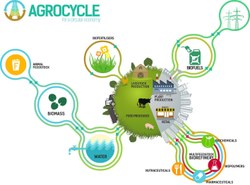Waste - AgroCycle
H2020 SC5 Climate Action
Continuing population and consumption growth are driving global food demand, with agricultural activity increasing to keep pace. Europe has a major agricultural waste problem, generating some 700 million tonnes of waste annually. There is an urgent need and huge opportunity to address the efficient use of agricultural wastes, co-products and by-products (AWCB) towards delivering sustainable value chains in the farming and processing sectors. As such, AgroCycle will convert low value agricultural waste into highly valuable products, achieving a 10% increase in waste recycling and valorisation by 2020. This will be achieved by developing a detailed and holistic understanding of the waste streams and piloting a key number of waste utilisation/valorisation pathways. It will bring technologies and systems from ~TRL4 to ~TRL7 within the 3 years of the project. A post-project commercialisation plan will bring commercially promising technologies/systems to TRL8 and TRL9, ensuring AgroCycle will have an enduring impact by achieving sustainable use of AWCB both inside and outside the agricultural sector, leading to the realisation of a Circular Economy.
AgroCycle addresses wastes from several agricultural sectors: wine, olive oil, horticulture, fruit, grassland, swine, dairy and poultry. The AgroCycle consortium is a large (25) multi-national group (including China) comprising the necessary and relevant multi-actors (i.e. researchers; companies in the technical, manufacturing, advisory, retail sectors (Large and SMEs); lead users; end users; and trade/producer associations) for achieving the project’s ambitions goals.
Farming’s unique regional (rural) location means that AgroCycle will help reduce the EU’s Innovation Divide and address the Regional Smart Specialisation Strategies for each partner country: impact will be Regional with National and International dimensions. The presence of three partners from China ensures international synergies and a global impact.
Objectives
- To map, characterise and quantify the available agricultural wastes, co-products and by-products (AWCB)
- To demonstrate the technical feasibility of the production of biofuels from AWCB
- To develop and evaluate the effectiveness and impact of existing and new biofertilisers from crop residues, livestock effluents and bioenergy effluents
- To demonstrate a generic and modular design process for valorisation, treatment and recycling of nutritional agro-industrial wastewaters and animal effluents
- To demonstrate an integrated bioremediation process for the valorisation, treatment and recycling of pig slurry
- To demonstrate the integrated multi-feedstock extraction of proteins, fibres and secondary plant metabolites (SPM) from horticultural waste streams
- To demonstrate the application of extracted biocompounds in nutraceuticals, active packaging, adhesives and coating applications
- To perform environmental and economic sustainability assessments through LCA/LCC
- To implement a joint stakeholder platform for knowledge exchange between actors
- To define sustainable value chains and propose new models for business diversification
- To maximise the innovation impacts of the project for contributing to the uptake of the project results for growth and jobs
Role of Ghent University
UGent is coordinator of WP3 of the project. The objective of this WP is to develop and evaluate the effectiveness and impact of existing and new biofertilisers from crop residues, livestock effluents and bioenergy effluents. In order to address this objective, this WP will quantify the fertilization potential of agricultural waste materials (straw, crop and animal residues, rice bran, etc) including new biofertilisers, and the impact on soil quality and soil organic carbon stocks; assess environmental impacts of agricultural waste materials including new biofertilisers, especially on water quality; formulate farming practices recommendations and guidelines concerning the use of new biofertilisers.
UGent will particularly contribute i) in the characterization of the AWCB with respect to nutrient availability on short and medium term, in particular nitrogen availability; ii) in estimating the contribution of AWCB to carbon sequestration in soils and greenhouse gas budgets; iii) in modeling the risk of nutrient losses (nitrogen and phosphorus) to ground- and surface water upon application of AWCB.
Contact
Prof. Stefaan De Neve
Department of Soil Management
Phone number: +32 9 264 6061
E-mail: Stefaan.DeNeve@UGent.be
